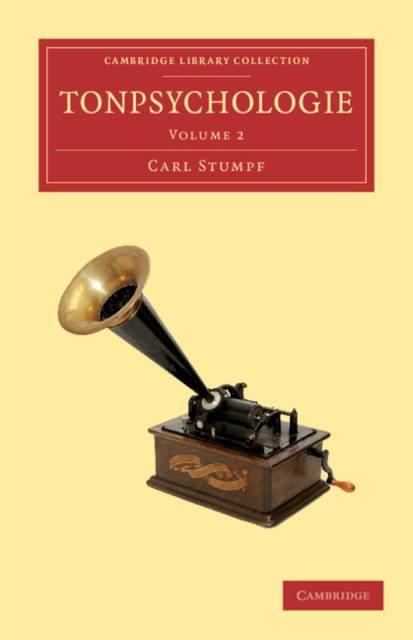
Bedankt voor het vertrouwen het afgelopen jaar! Om jou te bedanken bieden we GRATIS verzending (in België) aan op alles gedurende de hele maand januari.
- Afhalen na 1 uur in een winkel met voorraad
- In januari gratis thuislevering in België
- Ruim aanbod met 7 miljoen producten
Bedankt voor het vertrouwen het afgelopen jaar! Om jou te bedanken bieden we GRATIS verzending (in België) aan op alles gedurende de hele maand januari.
- Afhalen na 1 uur in een winkel met voorraad
- In januari gratis thuislevering in België
- Ruim aanbod met 7 miljoen producten
Zoeken
€ 117,95
+ 235 punten
Omschrijving
The German polymath Carl Stumpf (1848-1936) influenced one of the most significant philosophical developments of the early twentieth century: his student, Edmund Husserl, founded modern phenomenology. In a distinguished academic career spanning more than five decades, Stumpf also contributed to the growth of Gestalt psychology and ethnomusicology. An accomplished amateur musician, he used experimental methods to further the scientific study of music theory. His best-known work, first published in two volumes between 1883 and 1890, rigorously investigates the psychology of tone and music, ranging in coverage from physiology to acoustics. Its aim is to elucidate the effect that sounds have on various psychological functions. In Volume 2, Stumpf focuses on describing how the mind responds to listening to different sounds at the same time. He addresses the fusion of different sounds as well as distinguishing between sound and noise.
Specificaties
Betrokkenen
- Auteur(s):
- Uitgeverij:
Inhoud
- Aantal bladzijden:
- 602
- Taal:
- Duits
- Reeks:
Eigenschappen
- Productcode (EAN):
- 9781108061780
- Verschijningsdatum:
- 27/06/2013
- Uitvoering:
- Paperback
- Formaat:
- Trade paperback (VS)
- Afmetingen:
- 140 mm x 216 mm
- Gewicht:
- 752 g

Alleen bij Standaard Boekhandel
+ 235 punten op je klantenkaart van Standaard Boekhandel
Beoordelingen
We publiceren alleen reviews die voldoen aan de voorwaarden voor reviews. Bekijk onze voorwaarden voor reviews.









